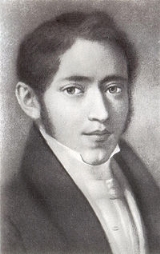
Nikolay Ogarev
Encyclopedia
Nikolay Platonovich Ogarev (Ogaryov; ; – ), was a Russian poet, historian and political activist. He was deeply critical of the limitations of the Emancipation of the Serfs claiming that the serfs were not free but had simply exchanged one form of serfdom for another.
Ogarev was a fellow-exile and collaborator of Alexander Herzen
on Kolokol
, a newspaper printed in England and smuggled into Russia. The two young men swore on the Sparrow Hills
above Moscow in 1840 not to rest until their country was free; the oath reportedly sustained them and their friends throughout many crises of their lives at home and abroad and was described in E. H. Carr's The Romantic Exiles.
From October 1874, Ogarev was living in Newcastle upon Tyne
where he arrived with his beloved Mary all the way from Genoa
. While in Newcastle, Ogarev worked on his 'Confession in Verse' and his 'Last Curse' (unfinished). The end of the year, however, saw the couple in Mary's home town of Greenwich
, where Ogarev died in 1877.
in a Russian noble family. Having lost his mother early, Nikolay spent his childhood years in his father's estate nearby Penza
. In 1920 he moved to Moscow. The year of 1826 saw the beginning of Ogaryov's long friendship with Aleksander Hertzen, a distant relative whom he instantly found two things in common: aversion to monarchy and deep empathy with the Decemberists' ideas.
Ogarev was a fellow-exile and collaborator of Alexander Herzen
Alexander Herzen
Aleksandr Ivanovich Herzen was a Russian pro-Western writer and thinker known as the "father of Russian socialism", and one of the main fathers of agrarian populism...
on Kolokol
Kolokol (newspaper)
Kolokol was the first Russian censorship-free weekly newspaper in Russian and French languages, published by Alexander Herzen and Nikolai Ogaryov in London and Geneva . Circulation – up to 2500 copies...
, a newspaper printed in England and smuggled into Russia. The two young men swore on the Sparrow Hills
Sparrow Hills
Sparrow Hills, Vorobyovy Gory is a hill on the right bank of the Moskva River and one of highest points in Moscow with an altitude up to 220 m ....
above Moscow in 1840 not to rest until their country was free; the oath reportedly sustained them and their friends throughout many crises of their lives at home and abroad and was described in E. H. Carr's The Romantic Exiles.
From October 1874, Ogarev was living in Newcastle upon Tyne
Newcastle upon Tyne
Newcastle upon Tyne is a city and metropolitan borough of Tyne and Wear, in North East England. Historically a part of Northumberland, it is situated on the north bank of the River Tyne...
where he arrived with his beloved Mary all the way from Genoa
Genoa
Genoa |Ligurian]] Zena ; Latin and, archaically, English Genua) is a city and an important seaport in northern Italy, the capital of the Province of Genoa and of the region of Liguria....
. While in Newcastle, Ogarev worked on his 'Confession in Verse' and his 'Last Curse' (unfinished). The end of the year, however, saw the couple in Mary's home town of Greenwich
Greenwich
Greenwich is a district of south London, England, located in the London Borough of Greenwich.Greenwich is best known for its maritime history and for giving its name to the Greenwich Meridian and Greenwich Mean Time...
, where Ogarev died in 1877.
Biography
Nikolay Ogaryov was born in Saint PetersburgSaint Petersburg
Saint Petersburg is a city and a federal subject of Russia located on the Neva River at the head of the Gulf of Finland on the Baltic Sea...
in a Russian noble family. Having lost his mother early, Nikolay spent his childhood years in his father's estate nearby Penza
Penza
-Honors:A minor planet, 3189 Penza, discovered by Soviet astronomer Nikolai Stepanovich Chernykh in 1978, is named after the city.-Notable residents:...
. In 1920 he moved to Moscow. The year of 1826 saw the beginning of Ogaryov's long friendship with Aleksander Hertzen, a distant relative whom he instantly found two things in common: aversion to monarchy and deep empathy with the Decemberists' ideas.

